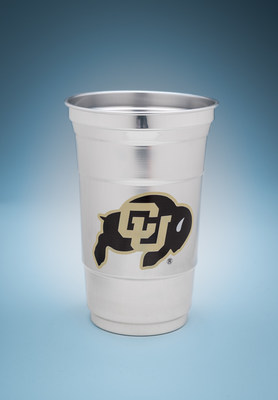Ball and CU Boulder Introduce Game-Changing Aluminum Cup to Collegiate Sports Fans
September 03, 2019
BROOMFIELD, Colo., Sept. 3, 2019 /PRNewswire/ -- Ball Corporation (NYSE: BLL) and the University of Colorado Boulder today announced a partnership to introduce Ball's infinitely recyclable aluminum cup to collegiate football fans at CU's Folsom Field during the 2019 football season. The lightweight aluminum cups will debut during the Colorado Buffaloes' home opener against the Nebraska Cornhuskers on Sept. 7.

Ball, a leader in cutting-edge sustainable beverage packaging, designed the aluminum cups in response to growing consumer preference for more sustainable products. The CU Athletic Department, which debuted the first NCAA Division I athletics sustainability program in 2008, will be the first collegiate venue in the nation to introduce the aluminum cups to sports fans.
"Ball and CU have a long history together, and we're proud to team up with them to pioneer sustainable solutions in our industries," said John A. Hayes, Ball's chairman, president and chief executive officer. "With CU's commitment to sustainability, the university is the ideal partner for piloting our new aluminum cup at the collegiate level. Sports fans are becoming more mindful about the impact their everyday choices have on the environment, and we're excited to offer them the opportunity to enjoy their favorite beverage at the game in our infinitely recyclable aluminum cup."
The partnership between the two sustainability leaders is part of Ball's recently launched pilot program, which will produce a limited supply of aluminum cups through 2020 to meet current customer demand from major sports and entertainment venues seeking to replace plastic cups.
At CU, the move will significantly reduce plastic use in the stadium this season, with the university's goal of becoming plastic-free in its sports venues by 2020.
"As an Athletic Department and university, we are proud of all we have done thus far and will continue to do in reducing our carbon footprint," said CU Athletic Director Rick George. "We are thrilled to partner with Ball on this important project. Being conscious of the environment is not only the right thing to do, it sets an example for our fans and everyone else watching that they should make sustainable choices, too."
Since debuting Ralphie's Green Stampede in 2008, CU became the first major college sports program to implement a zero waste program in all gameday venues. In 2016, a major athletics facilities upgrade achieved LEED Platinum certification from the United States Green Building Council thanks in part to a net-zero-energy Indoor Practice Facility that boasts an 850-kilowatt rooftop solar array.
Earlier this year, CU Athletics became the first university in the nation to sign the United Nations Sports for Climate Action Framework, joining other adopters such as the New York Yankees, NBA and Tokyo 2020 Summer Olympics. The agreement requires entities to reduce climate impact and promote responsible and sustainable consumption.
The Athletic Department's commitment is aligned with campus sustainability values as well. Just this week, the university's College of Engineering and Applied Science headquarters announced it will become the first academic building on campus to be entirely plastic-free for single-use beverages. And in early 2018, the university joined 12 other major research universities as founding members of the University Climate Change Coalition (UC3), which has committed to mobilize members' collective resources and expertise to accelerate local and regional climate action in partnership with businesses, cities and states.
Ball and CU hope that the new aluminum cup will inspire good recycling habits and bring more fans out to games.
Ball's research shows that 67 percent of U.S. consumers say they will visit a venue more often if they use aluminum cups instead of plastic and that 78 percent of consumers expect beverage brands to use environmentally friendly containers in the next five years.
Infinitely recyclable and economically valuable, aluminum is the most sustainable packaging material, and like aluminum cans, aluminum cups can be easily recycled. In fact, 75 percent of the aluminum ever produced is still in use today. In addition to its sustainability and recycling strengths, the aluminum cup is sturdy, durable and cool to the touch. It also can be customized with logos and graphics.
For more information about the Ball aluminum cup, visit www.ball.com/cups. For more information about CU Boulder's commitment to sustainable solutions, visit www.colorado.edu/sustainability.
About Ball Corporation
Ball Corporation supplies innovative, sustainable aluminum packaging solutions for beverage, personal care and household products customers, as well as aerospace and other technologies and services primarily for the U.S. government. Ball Corporation and its subsidiaries employ 17,500 people worldwide and reported 2018 net sales of $11.6 billion. For more information, visit www.ball.com, or connect with us on Facebook or Twitter.
About CU Boulder
At the foot of the Rocky Mountains, the University of Colorado Boulder is nationally recognized as one of only 36 AAU public research universities. Established in 1876, CU Boulder is a Tier 1 public research university with five Nobel laureates, nine MacArthur "genius" fellows and is the No. 1 public university recipient of NASA awards. CU Boulder is a leader in many fields, including aerospace engineering, physics and environmental law. The school partners with many notable federal research labs, including the National Center for Atmospheric Research, the National Oceanic and Atmospheric Administration (NOAA) and the National Institute of Standards and Technology (NIST).
Forward-Looking Statements
This release contains "forward-looking" statements concerning future events and financial performance. Words such as "expects," "anticipates," "estimates," "believes," "targets," "likely," "positions" and similar expressions typically identify forward-looking statements, which are generally any statements other than statements of historical fact. Such statements are based on current expectations or views of the future and are subject to risks and uncertainties, which could cause actual results or events to differ materially from those expressed or implied. You should therefore not place undue reliance upon any forward-looking statements and any such statements should be read in conjunction with, and, qualified in their entirety by, the cautionary statements referenced below. The company undertakes no obligation to publicly update or revise any forward-looking statements, whether as a result of new information, future events or otherwise. Key factors, risks and uncertainties that could cause actual outcomes and results to be different are summarized in filings with the Securities and Exchange Commission, including Exhibit 99 in our Form 10-K, which are available on our website and at www.sec.gov. Additional factors that might affect: a) our packaging segments include product demand fluctuations; availability/cost of raw materials and logistics; competitive packaging, pricing and substitution; changes in climate and weather; footprint adjustments and other manufacturing changes, including the startup of new facilities and lines; failure to achieve synergies, productivity improvements or cost reductions; mandatory deposit or other restrictive packaging laws; customer and supplier consolidation, power and supply chain interruptions; potential delays and tariffs related to the U.K's departure from the EU; changes in major customer or supplier contracts or a loss of a major customer or supplier; political instability and sanctions; currency controls; changes in foreign exchange or tax rates; and tariffs, trade actions, or other governmental actions in any country affecting goods produced by us or in our supply chain, including imported raw materials, such as pursuant to section 232 of the U.S. Trade Expansion Act of 1962; b) our aerospace segment include funding, authorization, availability and returns of government and commercial contracts; and delays, extensions and technical uncertainties affecting segment contracts; c) the company as a whole include those listed plus: changes in senior management; regulatory action or issues including tax, environmental, health and workplace safety, including U.S. FDA and other actions or public concerns affecting products filled in our containers, or chemicals or substances used in raw materials or in the manufacturing process; technological developments and innovations; litigation; strikes; labor cost changes; rates of return on assets of the company's defined benefit retirement plans; pension changes; uncertainties surrounding geopolitical events and governmental policies both in the U.S. and in other countries, including the U.S. government elections, budget, sequestration and debt limit; reduced cash flow; interest rates affecting our debt; and successful or unsuccessful joint ventures, acquisitions and divestitures, including with respect to the Rexam PLC acquisition, its integration, the associated divestiture, and their effects on our operating results and business generally.

SOURCE Ball Corporation


